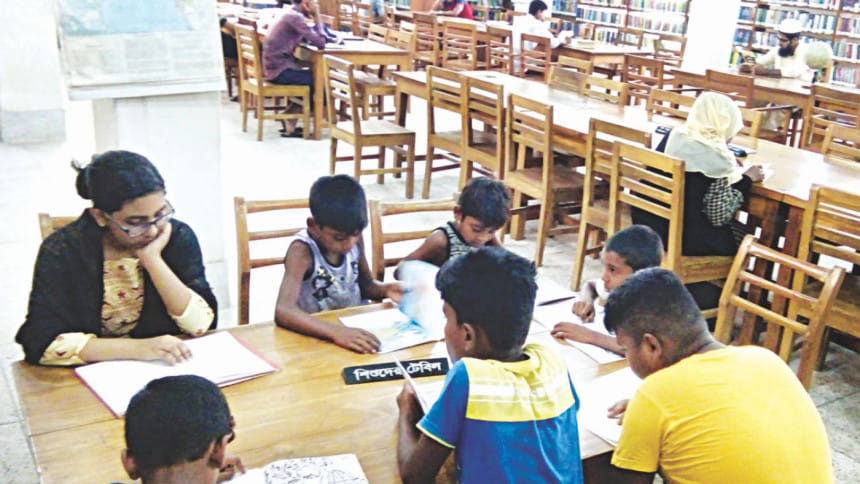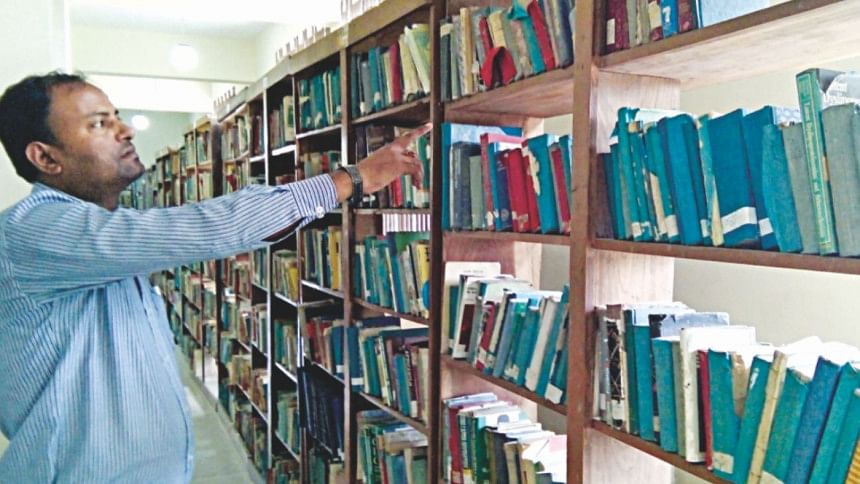The joy of reading

In this era of digital screens and the internet, a visit to Bogra's four-storied Woodburn Government Public Library comes as a pleasant surprise to any book lover. From ages eight to eighty the library is busy with patrons reading novels, texts and newspapers, making the most of the ample seating available on the lower floors. It's proof that traditional libraries remain popular in the modern world. But the Woodburn library has indeed been a well-patronised public centre of learning for the past 163 years.
“I've been visiting the library regularly since I was a child,” says Nawsin Tabassum who currently studies in class nine at Dhaka's Turkish Hope school. “I'm a keen reader. It gives mental refreshment and helps with my study. My parents always encouraged me to visit the library.”
Ruhul Amin, 28, a Master's student of mathematics at Government Azizul Haque College, finds a quiet place to concentrate. “I visit the library every day,” he says, “to prepare for job applications and exams. The library has been a huge support.”
For Shukumar Roy from Seujgari in Bogra Town the library has more personal meaning. “I used to visit the library with my grandfather,” he recalls. “He died last year. Nowadays I come here not only to read books but to remember his encouragement.”
In 1850, as a result of Britain's library movement, the British parliament passed a bill recognising the importance of public libraries. Four years later, as the private initiative of district magistrate C.S. Larkin, district collector J.N. Gupta and one Briton, a Mr. Royal, Bogra's institution named in honour of the-then British Lieutenant Governor of Bengal Sir John Woodburn, was founded.
Over the years the library has attracted renowned figures such as national poet Kazi Nazrul Islam, the former head of Calcutta University's English department Dr Mohinimohan Bhattarcharjjee, noted historian Dr Romesh Chandra Dutta, philosopher Kishorelal Roy, poet Kiron Shankar Das and mathematician Brojendralal Shiromoy, to name a few.
Woodburn, which in 2012 was merged with Bogra district public library, currently boasts around 215 members, with up to 500 daily visitors wishing to read books on the premises.

“I consider the library as my third son,” says librarian Rokonuzzaman who has revived the collection of rare books, rescuing ancient tomes from garbage and landfill. The library's historical book collection includes manuscripts such as “Padma Puran, Gobinda Kothamrito”, which is 350-years-old. “Greek and Roman Antiquity”; “History of the French Revolution”; and “Manual Thesis on the Languages and Manners of Eastern Nations”, are all century-old texts held by the library. According to the librarian, there are more than 50,000 books in English and Bangla in total, including many thousands of pages of rare handwritten text in the precious book collection, which by itself accounts for several thousand volumes.
“With the financial support of local educationists, Bogra's Nawab family and noted personalities, the library has been spreading knowledge in Bogra since its inception,” says Rokonuzzaman, who often works on public holidays, such is his enthusiasm.
It hasn't all been smooth sailing. Once some of the books were gutted by fire, and a plan to move the books to a new building in 2014 was met with local protests, with some protestors equipped with lethal weapons. But with the local administration's help the relocation was ultimately successful.
“It's difficult to preserve and secure our collection,” Rokonuzzaman notes. “We need an air-conditioned facility to do it properly. I have informed the public library department in the capital in the hope they can help.”
In the meantime the library will continue to be a source of enlightenment and pleasure for many. “I like to read different books as a way of enjoying my retirement,” says former banker Ranjan Kumar Paul, 69. “Books can help any human forget their frustrations and age-old problems.”
“The light from reading books in the library is useful in practical life,” says revenue officer Monirul Islam, 50, from Bogra's water development board office. “Reading is special to me and from the knowledge gained I can sometimes enlighten others.”
“The uncommon manuscripts found here must be preserved for reference by the next generation,” says a former teacher of Bogra Zila School, Shyamol Bhattracharjee. “They can serve as important reference works.”
Indeed, the most numerous category of library patrons are the very ones might most suspect of getting lost in computer and smart phone screens: the current generation of students of the various educational institutions around Bogra town and beyond.


 For all latest news, follow The Daily Star's Google News channel.
For all latest news, follow The Daily Star's Google News channel. 



Comments